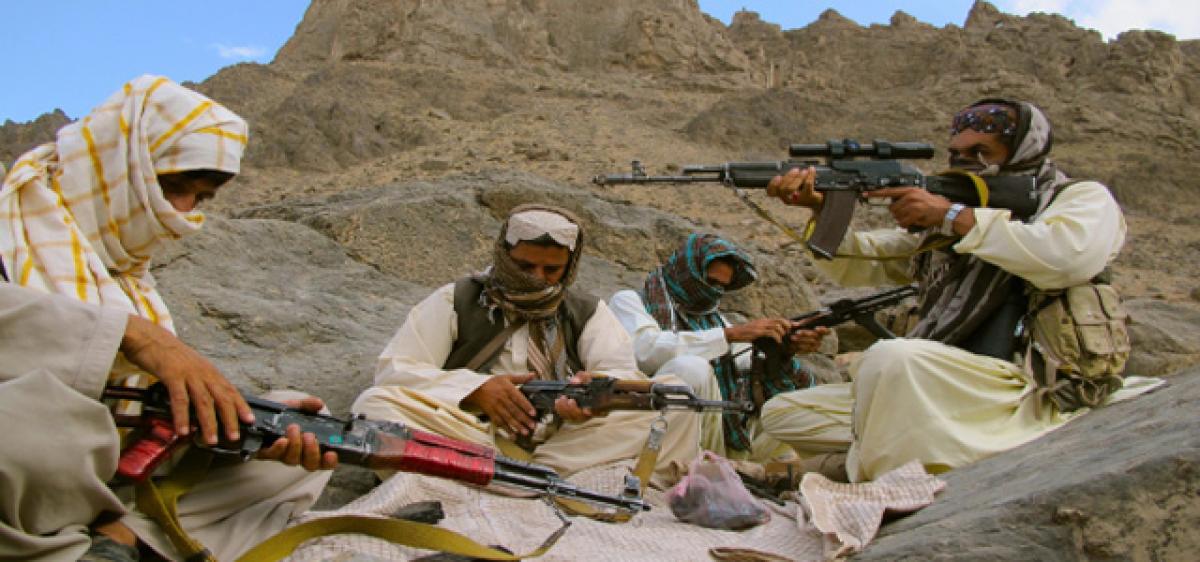Live
- Visakhapatnam will be destiny of Andhra Pradesh: Jagan Mohan Reddy
- OpenAI GPT-5 Launch: Expected Date, Upgrades, Price and More
- RBI sees India's GDP growth trend surging past 7 per cent
- Nifty Smallcap index registers fresh all-time high
- SC suspends Orissa Cong MLA's sentence in graft case
- RBI lists 6 factors powering India’s take-off to become world’s 3rd largest economy
- Multiple catalysts for re-rating across verticals as RIL exits fourth investment cycle: Morgan Stanley
- ISL announces tentative venue for 2023-24 final
- Indira Gandhi coined 'Gareebi Hatao' slogan, her grandson still repeating it: CM Yogi
- Pawan Kalyan’s assets up by 215 per cent, owns 11 vehicles
Just In

Over four months after Prime Minister Narendra Modi announced support to freedom-seeking people of Balochistan province in Pakistan, different government agencies remain divided on what to do next.
Over four months after Prime Minister Narendra Modi announced support to freedom-seeking people of Balochistan province in Pakistan, different government agencies remain divided on what to do next. Opinion is divided among a section that wants to continue with the old strategy of extending financial support to a few Baloch expats in Europe and among those who seek to back new and younger elements among Baloch separatists.
Differences in approach and a lack of clarity stems from the absence of any blueprint on how India can leverage Balochistan to pressure Pakistan. Support to Baloch groups fighting against Pakistan government and exposing human rights violations in Balochistan are seen as only two viable options before India. After all, India cannot carry out an overt action in Balochistan.
Conflicting ideas among agencies and lack of clarity on how to approach the issue has led to some decisions that could have easily been avoided. Modi’s announcement led to a sudden demand by exiled Baloch leaders to seek asylum or Indian help to form a government-in-exile, an idea that could have serious consequences for Kashmir.
The repression of Baloch resistance fighters by the Pakistan Army increased in the past 12 years and that triggered a flight of many into exile and in the absence of a single recognised leader or a grouping, there are a host of groups that vie for support in their fight against the Pakistani State.
On 22 September last year, New Delhi received Baloch Republican Party head Brahamdagh Bugti’s application for political asylum.
Brahamdagh is the founder of the Baloch Republican Party. News of his application saw his cousin Shahzain Bugti declared in Karachi that the Bugtis were Pakistanis and would fight for the country against India. He said their grandfather Nawab Akbar Bugti “was always with Pakistan,” reported PTI on 26 September.
A month later, Kabul-based Naela Quadri Baloch landed in Delhi and sought Indian help for a government-in-exile. She was criticised by Brahamdagh Bugti for making a demand for which there was no consensus among the Baloch people. Of the three groups fighting against the Pakistani state, Baloch Liberation Front (BLF) is the only group whose leader is operating from within the country.
The elusive Allah Nazar Baloch, head of BLF has a formidable reputation and Pakistani forces have been on his look out for long. India has backed Baloch leaders exiled in Europe and the US. But, the new generation of leaders like Allah Nazar must be supported, argue a section of Indian
government…
On 29 December, Hindustan Times reported that nearly 1,000 bodies of political activists and suspected separatists have been founds in Balochistan province in the past six years…Interestingly, there was no official reaction from the Indian government to this news report. May be because it was end of the year.
But, the Indian government needs to keep focus on reports of human rights violations and share such reports with the outside world. After Modi’s Independence Day speech, the Indian envoy to the UN Syed Akbaruddin did comment at length on the state of human rights in Balochistan and it attracted global attention.
Sustained attention needs to be focussed on human rights violations there and Pakistan’s dubious record needs to be exposed…After 1947, tribal leaders and clansmen were co-opted by the Pakistani state and Sardars (tribal leaders) and Waderas (clan leaders) secured major economic payoffs for their loyalty to the ruling elite in Islamabad.
While ordinary Balochi people remain subjugated and have the worst human development indicators in the province, Islamabad remains indifferent to their plight. New developments have bypassed the majority and the Gwadar port project and the CPEC that would connect China with the Arabian Sea has become yet another glaring example of a project that will bring no benefit to ordinary people…
Modi broke from the past and publicly announced India’s support to people of Balochistan. Traditionalists were taken aback by such a declaration and condemned it. But, others called it a brave gamble. Keeping the focus light on Pakistan’s record of discrimination and violation of human rights in Balochistan is a clever ploy to highlight the underbelly of the Pakistani State. Modi’s bold move needs government agencies to review and relook at their old policies and reorient them to back the new generation of Baloch leaders. (This article was first published at http://www.firstpost.com. Reprinted with their permission)
By Sunil Raman

© 2024 Hyderabad Media House Limited/The Hans India. All rights reserved. Powered by hocalwire.com







